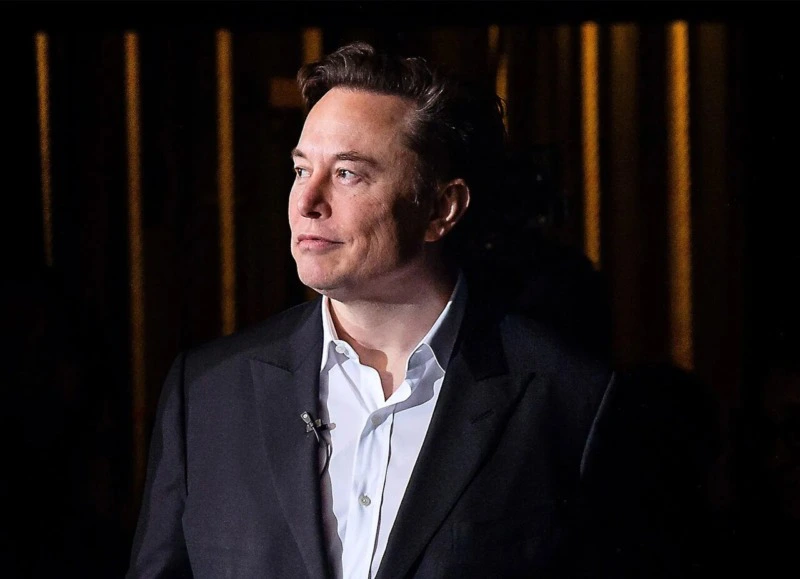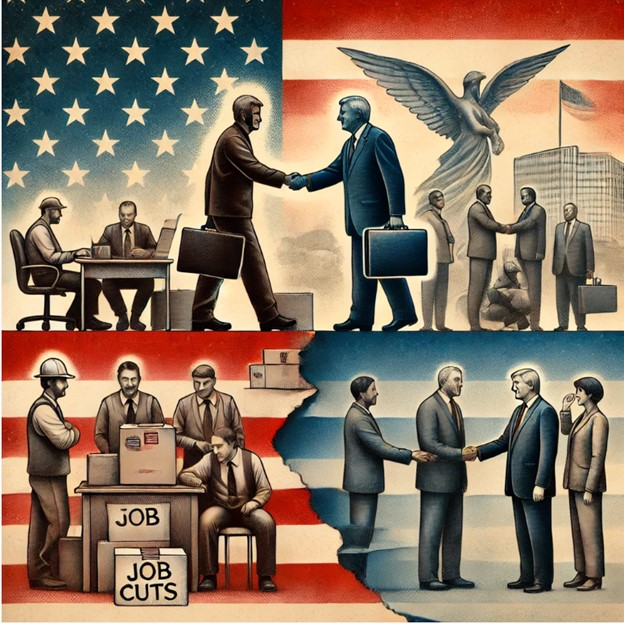Elon Musk's Government Overhaul: Constitutional Crisis or Efficiency?
Input
Changed
The Department of Government Efficiency (DOGE) and Elon Musk's Role The Legal Challenges and Dismantling Effort of USAID Consequences for the Federal Workforce and the Global Influence of the United States

The Department of Government Efficiency (DOGE) and Elon Musk's Role
The intersection of private enterprise and public administration has consistently been the subject of intense scrutiny. The Trump administration has recently stepped up its efforts to reform the federal government, with a particular emphasis on reducing bureaucratic inefficiencies. The appointment of Elon Musk as the head of the newly established Department of Government Efficiency (DOGE) has sparked a national debate, bringing concerns about constitutional legality, workforce stability, and international relations to the forefront. Musk's ambitious endeavor to restructure government agencies has led to widespread criticism and legal disputes, notably in the context of the U.S. Agency for International Development (USAID).
Elon Musk, the billionaire entrepreneur renowned for his leadership in Tesla, SpaceX, and numerous other high-tech ventures, has consistently promoted innovation and efficiency. His appointment to supervise DOGE is consistent with the Trump administration's overarching objective of integrating private-sector methodologies into federal operations and minimizing governmental waste. Proponents of this approach contend that Musk's history of optimizing large-scale enterprises renders him an ideal candidate to enhance the overall efficacy of federal agencies and streamline those agencies.
Nevertheless, Musk's methods have sparked controversy, particularly his direct and aggressive approach to agency restructuring. His team at DOGE has acted promptly to assess and eliminate federal programs that they perceive as redundant. USAID, an organization that has been instrumental in the administration of international development programs, disaster relief, and foreign aid, has been one of the most contentious targets. Musk has been vocal in his criticism of USAID, describing it as a "criminal organization" and arguing that its resources could be more effectively allocated elsewhere. This rhetoric has only served to escalate the tensions between the Department of General Services (DOGS) and federal employees, who perceive the action as an unwarranted dismantling of essential government functions.
The broader trend of tech industry figures assuming critical government positions is further exacerbating the controversy. The administration has been increasingly influenced by the "PayPal Mafia," a group of former PayPal executives. Although some believe that this is a necessary addition of efficiency and innovation to government operations, others are concerned about the unbridled influence of private-sector interests in public affairs. The discourse surrounding DOGE's initiatives is consistently influenced by the challenge of maintaining the impartiality and accountability of government functions while leveraging private expertise.
Musk's strategy is consistent with his well-documented business philosophy of cost-cutting and rapid experimentation. Nevertheless, government institutions operate within a framework of accountability and supervision that is intended to prevent hasty decisions that could have long-term repercussions, in contrast to the corporate world. The fundamental inquiry remains: Is it possible to effectively integrate the principles of private enterprise into public administration without jeopardizing the stability of critical services?

The Legal Challenges and Dismantling Effort of USAID
The attempted dismantling of USAID is one of the most significant legal conflicts that have arisen from DOGE's restructuring efforts. USAID, which was established in 1961, has been at the forefront of global humanitarian and economic development initiatives, providing billions of dollars in assistance to developing nations. The Trump administration's decision to close the agency was immediately met with a backlash from both domestic and international stakeholders who were concerned about the potential repercussions of an abrupt cessation of American support.
This decision was promptly met with a legal challenge. Reports suggested that Musk's representatives had threatened to employ law enforcement to assume control of agency operations, and federal employees at USAID resisted the DOGE team's attempts to access their headquarters. DOGE's actions were deemed unconstitutional by advocacy organizations, congressional representatives, and former USAID officials, who filed lawsuits in response to these aggressive tactics.
USAID's attempted dismantling was indefinitely suspended by a federal magistrate who determined that it was likely unconstitutional. The court emphasized that executive actions of this magnitude must comply with the constitutional principles of checks and balances, necessitating congressional approval prior to the implementation of substantial changes to federal agencies. This ruling has been celebrated as a victory for legal oversight, reaffirming the principle that the executive branch is unable to unilaterally dissolve critical governmental functions without the requisite legislative support.
Musk and his allies persist in their advocacy for a reevaluation of USAID's operations, despite this legal setback. Advocates contend that the agency's budget has expanded excessively and that more direct, private-sector-led solutions could produce superior outcomes. However, opponents caution that the dismantling of USAID would not only have a detrimental impact on vulnerable communities worldwide, but it would also reduce the United States' influence in global affairs. USAID's future is uncertain due to ongoing legal challenges and political resistance, as it serves as a critical battleground in the broader debate regarding government efficiency and constitutional authority. The case against DOGE's actions has been identified by legal experts as having the potential to establish a significant precedent regarding the constraints of executive power in the restructuring of federal agencies. The necessity for a more measured and legally sound approach to government reform could be indicated if the courts continue to rule against Musk's initiatives. Additionally, this case underscores the significance of upholding transparency and accountability in governance, guaranteeing that decisions that impact millions of individuals are subjected to appropriate scrutiny and legislative approval.

Consequences for the Federal Workforce and the Global Influence of the United States
In addition to USAID, the federal workforce has experienced significant disruptions as a result of DOGE's more extensive initiatives. The long-term impact on public services is a cause for concern, as thousands of employees from a variety of agencies have been laid off. The suddenness of these terminations has left numerous employees uncertain about their futures, leading to legal actions and objections from federal workers' unions. The argument that government agencies should be streamlined for efficiency is not novel; however, the pace and scope of these dismissals have been criticized as reckless and destabilizing.
Global allies who depend on U.S. assistance for humanitarian and development initiatives have expressed concern regarding the potential downsizing of USAID from an international perspective. Countries that have historically depended on American assistance are currently reevaluating their strategic alliances and are in the process of identifying alternative sources of support from the European Union, China, and other global powers. This change has the potential to alter the dynamics of international development and undermine U.S. diplomatic influence.
Additionally, the growing number of technology executives in government positions has raised concerns regarding the priorities that influence federal policy. Musk and other industry executives contribute valuable expertise; however, their private-sector-driven perspective does not always correspond with the public service mission’s objectives. The ongoing challenge will be to strike a balance between the preservation of the integrity of governmental institutions and innovation.
The broader debate regarding the future of federal agencies and the role of private-sector executives in public administration is underscored by the restructuring efforts led by DOGE. Although efficiency and cost-cutting are desirable objectives, they must be pursued within a framework that prioritizes the requirements of the public and upholds democratic principles.
The future of U.S. governance will be influenced by the ongoing debate regarding the role of private industry in public administration as the situation develops. While efficiency and reform are essential objectives, they must be pursued within the confines of constitutional law, as indicated by the legal rulings against DOGE's actions. The ability of the Trump administration and Musk's team to navigate these challenges while maintaining public trust remains uncertain. Musk's vision for government efficiency will be determined by the success of its implementation over the next few months, or by the resistance from legislators, the judiciary, and the public, which may necessitate a reevaluation of these strategies.





















